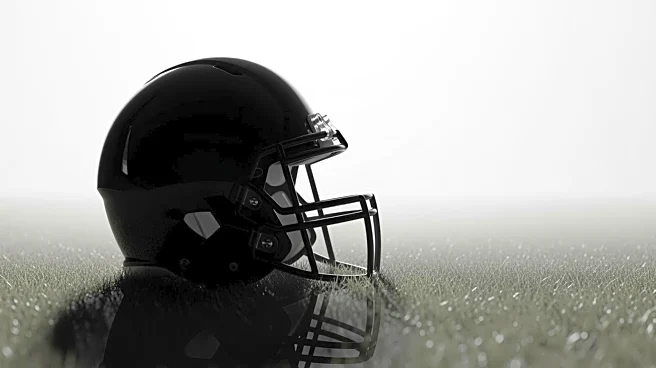What's Happening?
Marshawn Kneeland, a defensive end for the Dallas Cowboys, has died at the age of 24. His death is being investigated as a suspected suicide, according to the Frisco Police Department in Texas. Kneeland was
a second-round pick in the 2024 NFL draft from Western Michigan and had recently scored his first NFL touchdown during a 'Monday Night Football' game. The incident occurred between late Wednesday, November 5, and early Thursday, November 6. The police were involved in a pursuit of a vehicle that Kneeland was driving, which ended in a crash. Kneeland was found dead at the scene. The NFL and the Cowboys have expressed their condolences, and the NFL Players' Association is providing support to players and staff affected by the news.
Why It's Important?
The death of Marshawn Kneeland highlights the ongoing mental health challenges faced by athletes, particularly in high-pressure environments like the NFL. The incident underscores the importance of mental health support and resources for players. Kneeland's passing is a significant loss for the Cowboys and the broader football community, as he was a promising young talent with a bright future ahead. The situation also raises awareness about the need for comprehensive mental health programs within sports organizations to prevent such tragedies. The NFL and its players' association are likely to face increased scrutiny regarding their mental health policies and support systems.
What's Next?
The Collin County Medical Examiner's Office will determine the official cause of death. Meanwhile, the NFL and the Cowboys are expected to continue providing support to Kneeland's family, teammates, and staff. The incident may prompt the NFL to review and potentially enhance its mental health initiatives and support systems for players. Additionally, there may be increased advocacy for mental health awareness and resources within the sports community, aiming to prevent similar tragedies in the future.
Beyond the Headlines
Kneeland's death may lead to broader discussions about the pressures faced by professional athletes and the stigma surrounding mental health issues. It could also influence policy changes within sports organizations to prioritize mental health and well-being. The tragedy serves as a reminder of the human aspect of athletes, who often face immense pressure and scrutiny. This incident may encourage more open conversations about mental health in sports and society at large.











